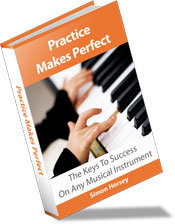When to start learning an instrument?

"When can my child start learning an instrument?"
"What is the correct age to start music lessons?"
"How old does my child need to be to start learning an instrument?"
"When is it appropriate to begin music lessons?"
These are questions on many parent's minds and the answer is the same for all of them
When the child is ready
This
is at different ages for different children. I have refused piano
students of 6 before, but I have also taken students who have only just
turned 5. Some teachers will take students at a younger age than others,
this makes neither right or wrong, it is a matter of personal
preference, and from my point of view, how much support the student will
get at home.
I often tell parents who wish their children to start learning an instrument very young that they may have to be satisfied with slower progress as it takes longer for the younger students to understand how music works. It might take an extra couple of months to complete each level – I prefer Chester's Easiest Piano Course for young children, although I also use John Thompson as well. I often give the analogy that what they complete in one and a half years as very young students, they could complete in nine months as slightly older students, i.e. if they started in nine months time, they would be at the same place a year and a half from now.
While this might be true (and it is just a very generalized estimation from me) it doesn't take into account the fact that I believe the younger a student starts taking lessons the more likely they are to gain an excellent sense of pitch, even to the point of perfect or absolute pitch. I have perfect pitch myself and I believe it comes from the fact I began learning the piano and recorder early in my life and so associated the pitches (frequencies) of the notes to the given letter names.
At what age is a child ready to start learning an instrument?
A child is ready to start learning if:
- They are interested in learning themselves
- They are physically capable of playing the instrument. E.g., a child of 6 is not a suitable candidate for the tenor saxophone or the trombone, but could begin on the piano or the recorder. They also need to be physically capable of small motor skills as well where independence of fingers in needed.
- They are mentally capable of concentrating for the duration of the lesson, understanding the basics of music, understanding the need to practice regularly
- They are not involved in so many other activities that music lessons and practice will seem just another chore to them
- They really really really want to play and bug you about starting music leassons day and night. In this case I don't believe the age is an issue. If they are physically incapable of playing the instrument talk to them about starting with another instrument with the intention of moving later. E.g., the piano (all instruments), the recorder (wind instruments), the violin (larger string instruments).
When are you ready for your child to start learning an instrument?
This is often a question that gets left out when the "how old should my child be to start" question comes up. You are ready when
- You can make time to learn a little about the instrument you child is learning and about music in general...and yes, everyone is musical to some extent. It just depends whether you are prepared to make some of the effort to learn you are expecting from your child.
- You are prepared to deal with their frustrations at having to practice rather than go out with their friends sometimes.
- You are financially committed to an instrument for them to practice on and buying any music repertoire they need. Music is getting cheaper, especially with some online services, but you still need to budget for it. Subscribe to the Newsletter on the left or the RSS feed and check back soon for a sheet music section to the website.
- You are prepared to get involved with helping to organize concerts, groups, trips etc. to give your child the maximum benefit and encourage performance
- You are prepared to take your child to concerts featuring their instrument because everybody needs inspiration.
- You are prepared to learn about how to practice effectively and efficiently to help support your child in making the most progress possible. Good news! You are already doing this by reading this website!
Which musical instrument is the best to start with?
There are almost as many answers to this question as there are instruments. At the end of the day "The one your child wants to play" is the best answer. If they are particularly young or there are other physical limitations you might want to suggest an alternative to start with such as the piano, recorder or violin, with the intention of moving on to start learning the instrument of their choice later.
Is it ever too late to start learning an instrument?
No! Absolutely not! If you wish to become a top concert performer there are various points of view about the age you need to have started learning, and there are always exceptions to this 'rule.'
More and more people are taking up musical instruments. Learning an instrument gives you something to focus on outside of day to day issues, it stimulates your creativity in all areas of life and can relieve stress. I personally know more than 10 people who have taken up instruments well into their 40s and 50s and in one case a lady in her 60s who, after 10 years of study and practice passed Grade VIII in her 70s! I also know plenty of people who started learning, have never taken an exam or performed in public in their lives, but enjoy playing at home.
If you are a parent here looking into music lessons for
your son or daughter...why not join them! You can support each other,
play duets together and a little healthy competition could benefit you
both!
It is never too late to enjoy playing music
Expert Practice Secrets
Frustrated with your practice? Read Practice Makes Perfect and hack the 10,000 hour rule. Cut your practice time by up to 25%! Make faster progress, learn pieces and scales faster, memorize more easily, and much more. "If you play an instrument you need this book!"
Recent Articles
-
Curdridge Parking
Jul 10, 25 06:11 PM
-
How To Speed Up Scales and Improve Accuracy
Oct 13, 24 04:23 AM
How to speed up scales is something many people want to know, but speed should also come with accuracy. Read on to find out how to do both. -
From an opera singer, on her death bed to Leonard Bernstein
Jan 29, 24 03:36 PM
I enjoy reading the music more than hearing it. From an opera singer, on her death bed to Leonard Bernstein

New! Comments
Have your say about what you've just read!Leave me a comment in the box below.